As a CDL truck driver, you know the open road is full of adventures and challenges. But there’s one challenge you can’t afford to overlook: keeping your personal and professional information secure. Whether hauling freight across the country or making local deliveries, maintaining confidentiality and security while moving is crucial. This guide provides practical tips to help you stay safe and protect your sensitive information.
Understanding the Risks
Before diving into the best practices, it’s essential to understand the types of threats you might face on the road. These include:
- Physical Theft: Your truck and personal belongings are at risk of theft, especially when parked in unsecured locations.
- Digital Threats: Cybercriminals can target you through unsecured Wi-Fi networks, phishing scams, and malware.
- Data Leakage: Accidental exposure to sensitive information can occur without proper precautions.
Best Practices for Physical Security
- Secure Parking: Always park in well-lit, secured areas. Use truck stops and parking facilities that have surveillance cameras and security personnel.
- Lock Up: Lock all doors and compartments, even briefly, whenever you leave your truck. Use high-quality locks and consider adding additional security devices like steering wheel locks.
- Limit Access: Only authorized personnel should be allowed into your truck. Be cautious of strangers trying to engage you in conversation near your vehicle.
- Maintain Situational Awareness: Always be aware of your surroundings. Trust your instincts—if something feels wrong, it probably isn’t.
Best Practices for Digital Security
- Use Secure Networks: Avoid using public Wi-Fi networks for sensitive activities. Use your mobile data or a personal hotspot instead. If you must use public Wi-Fi, use a Virtual Private Network (VPN) to encrypt your connection.
- Strong Passwords: Use strong, unique passwords for all your accounts. Avoid using easily guessable information like birthdays or common words. Consider using a password manager to keep track of your passwords securely.
- Two-Factor Authentication (2FA): Enable 2FA on all available accounts. This adds an extra layer of security by requiring a second form of verification in addition to your password.
- Keep Software Updated: Regularly update your device’s operating system, apps, and security software. These updates often include patches for security vulnerabilities.
Best Practices for Handling Sensitive Information
- Limit Data Exposure: Carry only the necessary documents and information with you. Store sensitive documents in a secure, locked location within your truck.
- Shred Documents: Use a portable shredder to destroy any documents you no longer need. This prevents sensitive information from falling into the wrong hands.
- Be Cautious with Communications: Avoid discussing sensitive information over the phone or through text messages in public places. Use secure communication apps for sensitive conversations.
- Data Encryption: Encrypt sensitive files on your devices. This ensures that the information remains protected even if your device is stolen.
Best Practices for Online Presence
- Social Media Caution: Be mindful of what you share on social media. Avoid posting real-time updates about your location and travel plans.
- Privacy Settings: You can adjust the privacy settings on your social media accounts to limit who can see your posts and personal information.
- Monitor Accounts: Regularly monitor your online accounts for any suspicious activity. Set up alerts for unusual login attempts or changes to account settings.
Training and Awareness
- Stay Informed: Keep up to date with the latest security threats and best practices. Subscribe to security newsletters and follow trusted sources for cybersecurity news.
- Training Programs: Participate in security training programs offered by your employer or industry organizations. These programs can provide valuable insights and practical tips for staying secure.
- Emergency Contacts: Keep a list of emergency contacts, including your company’s security team, local law enforcement, and your bank’s fraud department. Know who to contact in case of a security breach or theft.
Maintaining confidentiality and security while working on the road is a continuous process that requires vigilance and proactive measures. By following these best practices, CDL truck drivers can protect themselves and their sensitive information from threats. Remember, security isn’t just a one-time effort—it’s a mindset that should be integrated into your daily routine.


